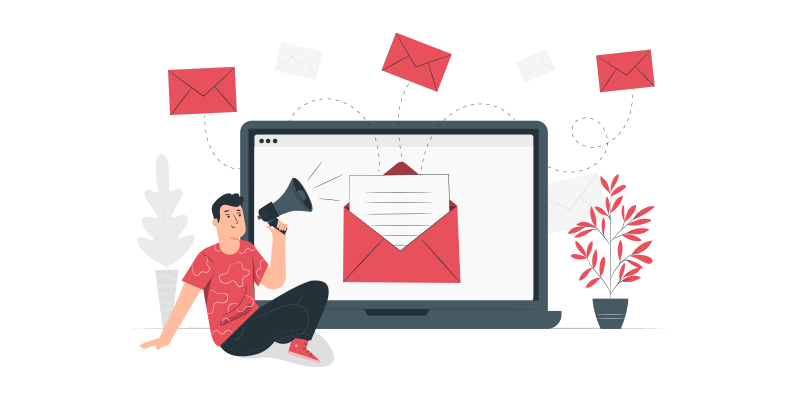Updated: July 12, 2023
If you pass this on, something good will happen to you today! Don’t break the chain!
How many of us have received chain messages that start similarly? It’s an all too unfortunate reality that we face. Maybe some of us remember that chain email that talked about Bill Gates sharing his fortune with whoever forwarded the message.
So, is there a clear-cut answer? Regardless of what’s in them, are chain messages safe to open? In this article, we try our best to answer that question and other related ones, and give you some best practices based on our experience of over 18 years in the email industry.

Are Chain Messages Safe?
There are two answers on whether chain messages are safe or not - a short one and a more complex one. We’ll share both.
Short Answer
No.
Chain messages are distributed worldwide, from any country or area, and to any age group. Spammers and cybercriminals take advantage of vulnerabilities or tug at weak spots people have. Some of the scenarios that can occur include:
- Issues with money (anything that includes following a specific amount of steps to get a sum of money)
- Relationship problems (this email will help you find the love of your life)
- Helping a cause (help save this child from a life-threatening disease by donating money and forwarding the email)
- Bad luck or fear-related issues (if you don’t forward this email, you will have bad luck for the rest of your life, or something terrible will happen)
- And many more.
Long Answer
Because of their strong ability to multiply quickly, the danger of chain messages is ever-present, but the intent differs from case to case. Spammers send them to overload servers, while some want to spread actual viruses or malware. Others seek to harvest email addresses that can potentially become a target for scams and spam that contain illegal or inappropriate content.
Chain messages don’t have to be dangerous, but that all depends on what the person receiving them decides to do. If the person receiving it doesn’t open any attachments, click on any links, or forward it, they’ll break the chain. If everyone did this, we could potentially be free of the risks associated with chain emails.
Legal Implications of Chain Emails
Similar to Business Email Compromise attacks, chain messages are another form of internet fraud. Some ISPs prohibit propagating chain emails, so you may find yourself losing access to your account or getting blacklisted if you forward them. If you think you might be in this situation, check out our piece on how to check if you’re blacklisted.
Additionally, emails requesting money are illegal. As mentioned earlier, some chain messages can contain illegal content, and by forwarding them, you may even commit a criminal offense. Any “official-looking” chain messages received from the FBI, the U.S. military, or similar institutions must be discarded, as the FBI doesn’t send out emails. These types of messages can ask for information such as a social security number, bank account information, or credit card information.
For ISPs, it becomes challenging to protect businesses and every individual. All it can take is for one person to forward one chain email, and already it can potentially reach a million inboxes in a matter of hours. This puts businesses and companies at risk of scams and fraud, while individuals are at risk of credit fraud or identity theft.
Make sure to also take a look at our Lawful Interception Overview article for information and best practices on keeping your information as safe as possible.
What Should You Do If You Receive Chain Mail?
Recognizing harmful chain emails is not very hard, but what should you do if you do want to forward something to your friends and family? Follow the best practices listed below:
- Do a little bit of internet digging before forwarding any chain mail. If it’s a chain email, Google will let you know. Also, you can check for common hoaxes by checking the Urban Legends website, and you may be surprised to find scams that you recognize
- Verify that the email is valid. You can do this in multiple ways. Either check Google, from the IP address, or through an email verification website
- Keep your operating systems up to date. Always install the latest updates and ensure your computer has the latest protection
- Be very careful what you download. Some email attachments can bypass even the most vigilant antivirus software with advanced malicious code. Never open an attachment from someone you don’t know, and be wary of them from the people you do know
- Never reply to spam or chain messages even if you see an unsubscribe button or “remove me from this email list.” Replying will confirm your email address, and you’ll end up receiving even more spam
- Use the BCC option on your email when selecting the recipients, though not before you delete everything else from the email, such as headers with other email addresses or personal identifiable information. By using BCC, the email list won’t be public for any recipients in the future
- Get Axigen. Axigen takes the stress off of your shoulders and offers you a fully transparent and secure email service, complete with protection against spam, viruses, data theft, and data loss. You also have AntiVirus and AntiSpam included for extra email protection. View Axigen’s full security feature set here.
Axigen Can Protect You from the Worst Email Chains
We learned how dangerous chain messages could be. The best thing to do would be not to open them and immediately discard them. Unfortunately, since spammers or cybercriminals can use email chains to attack any age group in any area, not everyone understands the threat they pose.
That’s why Axigen offers you a fast and secure email platform to keep you, your information, and your data safe against malicious chain emails.